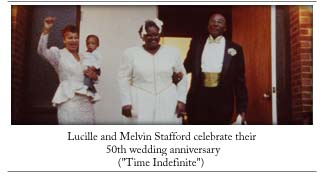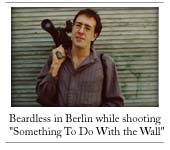
|





 McElwee received a $9000 grant to make a documentary on the devastating
effects of William T. Sherman's march through the South and its effect on the
modern South. But before leaving to begin his shoot, his girlfriend ended
their relationship in New York, and suddenly he no longer felt enthusiastic
about the film.
McElwee received a $9000 grant to make a documentary on the devastating
effects of William T. Sherman's march through the South and its effect on the
modern South. But before leaving to begin his shoot, his girlfriend ended
their relationship in New York, and suddenly he no longer felt enthusiastic
about the film.
He nevertheless went South, following Sherman's trail, but decided to document
his personal quest for a girlfriend. McElwee says that the film is about
"meditation on the possibility of romantic love in the South today." Along the
way, he meets many quirky women: an aspiring actress who longs to meet Burt
Reynolds; a survivalist; a linguist living like a hermit; and, a rock singer.
He also visits Charleen Swansea, an old friend and his former high school
teacher who gives him some advice. When these relationships do not pan out, he
seeks out a former girlfriend.
In the end, he didn't find true love but his film was enormously popular.
Sherman's March won the grand jury prize for documentaries at the 1987
Sundance Film Festival.
(Note: The full title is "Sherman's March: A Meditation on the Possibility
of Romantic Love In the South During an Era of Nuclear Weapons
Proliferation.")

"...he's a filmmaker-anthropologist with a rare appreciation for the
eccentric details of our edgy civilization." New York Times
Sherman's March won the '87 Grand Jury Prize at the Sundance Film
Festival.

 In a follow up film to Sherman's March, McElwee again chronicles his
life, this time focusing on the cyclical pattern that revolves around life and
death, and, the people who are important in his life. The film opens with
McElwee announcing his engagement to filmmaker Marilyn Levine. He carries his
camera with him to all the important places as he obtains his marriage license,
the blood test, and even films Marilyn's gynecological exam. There are no
sacred places where the camera is concerned. During his wedding, he allows a
friend to film the ceremony after some degree of persuasion. Shortly after the
marriage, Marilyn becomes pregnant but all these happy events suddenly take a
turn. The direction of the film drastically changes when several people who
are close to McElwee die. He is so traumatized that he actually puts down his
camera for a number of months. He has an epiphany as he realizes that birth
inevitably will lead to death. In a way, this journey becomes a religious
experience for him as he weaves in biblical references throughout. Finally,
his son Adrian is born and he seems to come to terms with the events that have
taken place in his life. In a follow up film to Sherman's March, McElwee again chronicles his
life, this time focusing on the cyclical pattern that revolves around life and
death, and, the people who are important in his life. The film opens with
McElwee announcing his engagement to filmmaker Marilyn Levine. He carries his
camera with him to all the important places as he obtains his marriage license,
the blood test, and even films Marilyn's gynecological exam. There are no
sacred places where the camera is concerned. During his wedding, he allows a
friend to film the ceremony after some degree of persuasion. Shortly after the
marriage, Marilyn becomes pregnant but all these happy events suddenly take a
turn. The direction of the film drastically changes when several people who
are close to McElwee die. He is so traumatized that he actually puts down his
camera for a number of months. He has an epiphany as he realizes that birth
inevitably will lead to death. In a way, this journey becomes a religious
experience for him as he weaves in biblical references throughout. Finally,
his son Adrian is born and he seems to come to terms with the events that have
taken place in his life.

Here's a review of "Time Indefinite" by Gil Lahav
The Web site Film.com
reviews current movies and offers an archive section complete with new and old
film reviews including one of "Time Indefinite"
(http://www.film.com/filma/reviews/quickrev.idc?REV=1017)
"Time Indefinite conveys a sensuous appreciation of the physical
world that is so acute that the environment is almost as important as the
people." New York Times
"Ross McElwee is Don Quixote with a camera, an impractical visionary
ever on a quest." Washington Post
"There's an air of emotional intimacy in McElwee's films, and a note of
constant surprise. Things seem to happen, and people spill forth great
truths--as if a special filmmaker's angel had sprinkled fairy dust on this
shlumpy, bearded, self-effacing guy." San Francisco Chronicle


In this work, McElwee points the camera in a new direction. He teams
up with his wife, fellow documentarian Marilyn Levine, to make a film on
everyday life in Berlin. It takes place before and after the Wall came down.
They went to Berlin on the 25th anniversary of the Wall in 1986. The two stake
 out Checkpoint Charlie where they interview and document life in Berlin. Some
of the more memorable moments captured include a boy painting graffiti on the
Wall with blood and another person protesting its existence with a pickax. The
second part of the film entitled The Liberation takes place after the
Wall has been destroyed. They venture into the neighborhood near Checkpoint
Charlie when East Germans were flooding into West Germany. They capture one
woman at dinner who describes her joy in finally being reunited with her cousin
after twenty-five years.. McElwee and Levine say they were interested in
capturing the people who lived through this experience of forced separation. out Checkpoint Charlie where they interview and document life in Berlin. Some
of the more memorable moments captured include a boy painting graffiti on the
Wall with blood and another person protesting its existence with a pickax. The
second part of the film entitled The Liberation takes place after the
Wall has been destroyed. They venture into the neighborhood near Checkpoint
Charlie when East Germans were flooding into West Germany. They capture one
woman at dinner who describes her joy in finally being reunited with her cousin
after twenty-five years.. McElwee and Levine say they were interested in
capturing the people who lived through this experience of forced separation.
For more on these films and others by McElwee, there are several film
magazines interviews and critiques which appear elsewhere on this Web site.
|